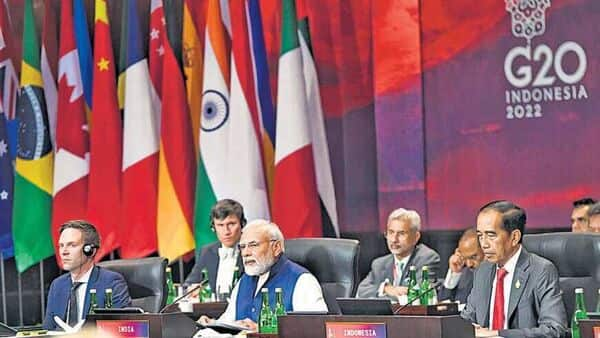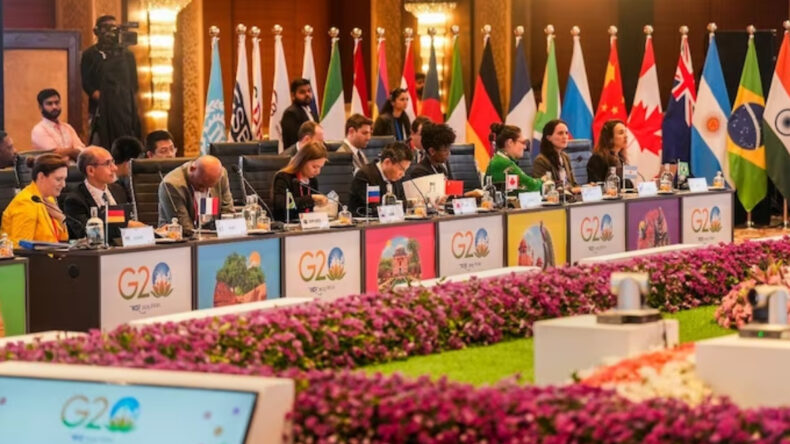On September 9 and 10, the G20 Summit will take place in New Delhi, bringing together the heads of state and government of 19 nations (as well as the European Union). The international forum’s year-long presidency by India will come to an end at this point.
Such summits typically culminate with a declaration or shared communique that is approved by all participants. It outlines shared opinions on issues like commitments connected to climate change, international disputes, and potential future areas of collaboration.
What is the agenda of the G20 Summit?
At the beginning of G20 summits, no specific agenda was stated. But India has made sustainability a key concern in light of the year’s theme, “Vasudhaiva Kutumbakam: One Earth, One Family, One Future.”
Additionally, according to a recent White House statement, “G20 partners will discuss a range of joint efforts to tackle global issues, including on the clean energy transition and combating climate change, mitigating the economic and social effects of Putin’s war in Ukraine, and increasing the capacity of multilateral development banks, including the World Bank, to better fight poverty, including by addressing global challenges.”
India has also positioned itself as the “voice of the Global South,” a platform for underrepresented nations to make their concerns known in international politics. Acting as a side that can find common ground in international conflicts, like the ongoing crisis in Ukraine, is one component of this.
In the meantime, Russian Foreign Minister Sergey Lavrov will represent his nation at the Delhi meeting in place of Russian President Vladimir Putin. Earlier this month, Lavrov stated that Russia would prevent the G20 summit’s final declaration from being released unless it reflected Moscow’s stance on the Ukraine and other crises. This might result in the participants issuing a non-binding or incomplete communique, according to Reuters.
Additionally, the brief encounter between Chinese President Xi Jinping and Indian Prime Minister Narendra Modi at the summit’s dinner in Indonesia last year was their first in two years. The dialogue between the two countries in New Delhi was expected as being essential to preserving communication channels due to the two countries’ “abnormal” ties and border difficulties in the western sector of the Line of Actual Control (LAC), in Ladakh.
Both PM Modi and President Xi “agreed” to “order their relevant officials to enhance efforts at speedy disengagement and de-escalation” of soldiers along the LAC” at the recently concluded BRICS Summit in Africa, although both nations later presented conflicting assessments of the meeting’s results. Xi won’t be present at the G20 summit anymore, instead, Chinese Premier Li Qiang will be there.

What has happened at the G20 meetings so far?
Meetings on a variety of topics, including health, tourism, finance, and other topics, are held throughout the year in different cities in the host nation. This occurs under many “Tracks,” some of which involve government representatives and others which involve non-governmental actors like civil society organisations.
Amitabh Kant, the G20 Sherpa for India, said last month that 185 sessions, including 13 ministerial-level discussions, had already taken place. Consensus had been reached on the adoption of 12 result documents and 12 further deliverables, but no joint communiques.
Finance Ministers and Central Bank Governors’ Meeting
In numerous cases, China has backed Russian stances on linguistic issues connected to Ukraine. The inaugural G20 Finance Ministers and Central Bank Governors (FMCBG) gathering, held in Bengaluru in February 2024 while India held the G20 Presidency, abstained from publishing a Communique. After Russia and China objected to the passages denouncing Russia’s war on Ukraine, it instead produced a “Chair’s Summary and Outcome Document”.
The Summary’s paragraphs 3 and 4 were “exactly what the Bali Leaders’ Summit had come up with,” according to Union Finance Minister Nirmala Sitharaman. Russia and China, however, expressed concerns. So, a Communique cannot be sent out with a footnote. Therefore, a Chair’s Summary and Outcome Document was required.
The two contentious lines reaffirmed the position of the participating countries over the ongoing conflict and condemned “in the strongest terms the aggression by the Russian Federation against Ukraine” while calling for Russia to “complete and unconditionally withdraw from the territory of Ukraine.” The paragraphs that Russia and China are opposed to emphasise that “peaceful resolution of conflicts, efforts to address crises, as well as diplomacy and dialogue, are vital” and “Today’s era must not be of war.”
Enhancing international policy coordination and directing the world economy towards guaranteeing robust, sustainable, balanced, and equitable growth were both mentioned in the summary.
Tourism Ministerial Meeting
More than 12 ministers from different nations attended the G20 Tourism Ministerial Meeting, which took place in Goa over four days in June. This conference was also missed by China, which didn’t send a representative to the previous tourism working group meeting in Srinagar.
The five tourism priority areas identified by India’s G20 Presidency — “Green Tourism; Digitalization; Skills; Tourism MSMEs; and Destination Management” — were supported by all of the ministers. In addition, they promised to promote “gender equality and women’s empowerment through tourism policies and initiatives.”
The final conclusion paper said that paragraphs 1 through 3 and 6 through 36 “have been unanimously agreed to by all G20 delegations”. Regarding sentences 4 and 5, only the chair’s summary was made public. The Bali Declaration’s paragraphs 4 and 5 demanded an immediate end to the violence in Ukraine.
Environment and Climate Ministers’ Meeting
Following the adoption of an outcome document, the Chennai High Level Principles for a Sustainable and Resilient Blue/Ocean-based Economy, a meeting was held in Chennai in July. However, there was no agreement on any wording that signified increased action, thus hopes from the world’s biggest economies for a push for more aggressive climate action remained in vain.
On the most important topics, such as strengthening emission reduction targets and reaching the global peak of emissions by 2025, there was continued disagreement at the ministerial meeting. While wealthy countries pushed for everyone to increase their mitigation targets, the poor countries in the group focused on delivering on unfulfilled financial and technological promises and challenged the developed countries to go farther, highlighting a well-known divide.
Health Ministers’ Meeting
Vaccine, therapeutic, and diagnostic drug research and manufacturing networks, as well as a platform for making open-source, interoperable digital solutions easily accessible, were all agreed upon at a meeting in Gandhinagar in August.
A 25-point outcome document and the chair’s report were also produced as a result. A forum for exchanging digital resources and information, the Global Initiative Digital Health, was also introduced. It will be supported by four pillars: a platform for knowledge sharing to apply these technologies at scale, a library of existing digital tools, an ask tracker to track technology that countries need, and an investment tracker.
The documents regarding the Russia-Ukraine war did not simply contain one phrase where agreement was reached. Russia objected to its inclusion, claiming that it did not follow the G20’s directives. China also argued against the inclusion of geopolitical elements and said the G20 was the wrong venue for discussing security issues.
Trade and Investment Ministerial Meeting
An outcome document and the chair’s report were produced as a result of the trade and investment meeting in Jaipur in August. They demanded actions to encourage the digitization of trade documentation, a general mapping framework for global value chains (GVCs), and a “Jaipur Call for Action” to improve MSMEs’ access to information. China and Russia both objected to the need to include the Ukraine War in that particular meeting and to any mention of it.
Five main issues were discussed by the G20 members: trade for growth and prosperity, trade and a robust global value chain, integrating MSMEs into international trade, logistics for trade, and World Trade Organisation (WTO) reform. The ministers confirmed their intention to hold talks in order to create a fully functional dispute resolution system that is accessible to all members by 2024.













